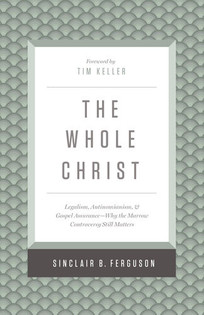If you had asked me before reading Sinclair Ferguson’s The Whole Christ: Legalism, Antinomianism, & Gospel Assurance—Why the Marrow Controversy Still Matters whether I lean towards the false doctrine of legalism or the false doctrine of antinomianism, I’d have said “antinomianism” without hesitation. Having read Ferguson’s excellent book, I’d still say “antinomianism”, but with a good deal of hesitation.

The Whole Christ has its origins in a book published in the 1640s called The Marrow of Modern Divinity. This earlier book is likewise excellent, and if you’ve not read it I’d encourage you to go do so now. In brief, it is a dialogue between four people: a legalist, an antinomian, a new Christian, and a preacher. Given the characters, it’s probably clear that the book covers the question of the role of the law in the life of a believer. That in itself would make the book worth reading (the exposition of the 10 Commandments in the book is especially good), but it has a later historical importance as well. In the 1700s, a controversy erupted in Scotland (the “Marrow Controversy”) over the role of the law in the church, in Christian life, and, especially, in evangelism that focused on the best way to articulate the Gospel.
Just what do these old controversies have to do with us today? Answering that question is the subject of The Whole Christ.
As the subtitle suggestions, Ferguson covers the same grounds as The Marrow did before him. Legalism, antinomianism, and assurance are all put under the microscope and weighed against the measure of Scripture. And each of them, according to both Ferguson and The Marrow can only be properly understood when Christ is remembered in conjunction with the benefits he offers. That is, we fall into legalism or antinomianism or we lose assurance when we focus on the benefits we gain as those united with Christ (freedom from the guilt of the law, avoidance of hell, access to heaven, etc) rather than on the Person with whom we are united and through whom we receive those benefits.
For example, when we speak of what Christ does as somehow separate from who he is, we start to think of God the Father as an unwilling agent in our salvation:
“The subtle danger here should be obvious: if we speak of the cross of Christ as the cause of the love of the Father, we imply that behind the cross and apart from it he may not actually love us at all. He needs to be ‘paid’ a ransom price in order to love us….
We must not confuse the truth that our sins are forgiven only because of the death and resurrection of Christ with the very different notion that God loves us only because of the death and resurrection of Christ. No, ‘he loved us from the first of time’ and therefore sent his Son, who came willingly, to die for us.” (66)
Likewise when we separate Christ from His work we incline to legalism, by giving the Law a task it was not intended to bear as a further mediator between God the Father and us. Or we incline to antinomianism, since we start to treat the law as an eternal abstraction rather than as the reflection of the person to whom we are united and so irrelevant to our daily lives. In either case, our assurance is undermined because our focus is taken off Christ and put on either the Law (which we have failed to keep) or on ourselves (who, deep down, we know not to have kept the Law).
All of which to say that The Whole Christ is excellent, encouraging, and well worth your time. If it’s not on your to-read list it should be put there now. If it is on your list, you should move it to the top.
Dr. Coyle Neal is co-host of the City of Man Podcast and an Associate Professor of Political Science at Southwest Baptist University in Bolivar, MO.













